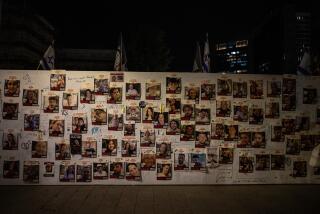Fighting a War in Name Only
- Share via
According to President Bush, the global war on terror is the central event of our time, comparable “to the great struggles of the last century.” As prior generations confronted the challenges of Nazism and Stalinism, so destiny summons the present generation to defeat global terror. This has become America’s mission -- to “defend the peace through the forward march of freedom.”
Yet peeling back the rhetoric reveals a different story. By historical standards, the enterprise that some have described as another world war has turned out to be a niggling affair. Bush has asked nothing and required nothing of Americans. And nothing pretty much describes what we’ve anted up to support the cause.
With the third anniversary of the war on terror fast approaching, the administration has not expanded the armed forces and apparently has no plans to do so. It categorically rejects proposals to revive the draft. It has left untouched the rituals of consumption deemed essential to the American economy. It has studiously refrained from curtailing corporate profits or prerogatives. Old-timers will recall when big wars meant rationing and higher taxes. Not this time. Through deficit spending, we will slough off the cost of war onto future generations.
Thus, for most Americans, the global war on terror has become a little like global warming: We sense dimly that we ought to take it seriously, but in practice we go about our daily routine as if it didn’t exist.
Pass through a major airport, visit a mall, shop for a new car and look for signs that this nation is engaged in anything approximating a great struggle. There are none.
Which suits Bush just fine. Real wars -- those that engage the passions of the American people -- energize politics and subvert the established order. Change is the last thing this administration wants. For despite the high-sounding talk, the overriding aim of this war is not to march toward freedom but to dissuade Americans from peering too deeply at the events of 9/11. Were they to do so, they just might pose discomfiting questions about the competence of our leaders, the organization and purposes of government and the rationale of U.S. foreign policy.
The contrast with World War II is instructive. To fight that war Franklin D. Roosevelt mobilized the nation. The result was decisive victory. But with victory came other, largely unanticipated consequences. Roosevelt’s crusade to liberate enslaved nations raised questions about the meaning of freedom at home. As such, it gave impetus to the embryonic civil rights movement. It undermined old notions of a woman’s “place.” It affirmed workers’ rights to organize and bargain collectively. It extinguished old forms of religious bigotry. It created a new class of politically aware and upwardly mobile citizens -- 16 million returning veterans.
Not all of the war’s effects were benign. Japanese Americans were sent to concentration camps. Economic mobilization and urban overcrowding produced profiteering, crime, social dislocation and race riots.
But overall, World War II reinvigorated American democracy. Small wonder that for those who fought it the war remained thereafter the central event of their lives.
My mother is an 81-year-old veteran. After graduating from high school in 1941, she became an Army nurse, serving in Saipan and Tinian. Her military service remains the pivot of her young adulthood. Our youngest daughter is today the same age as my mother was then. Sixty years from now, will she regale her grandchildren with stories of what it was like to live through the war on terror? The question answers itself.
Dedicating the National World War II Memorial last month, Bush quoted Col. Oveta Culp Hobby, a veteran of that conflict: “This was a people’s war, and everyone was in it.” It was, and they were. But Bush’s war isn’t -- and we aren’t. And the difference speaks volumes about the prospects for victory and about the content of our democracy.
More to Read
Get the L.A. Times Politics newsletter
Deeply reported insights into legislation, politics and policy from Sacramento, Washington and beyond. In your inbox twice per week.
You may occasionally receive promotional content from the Los Angeles Times.










